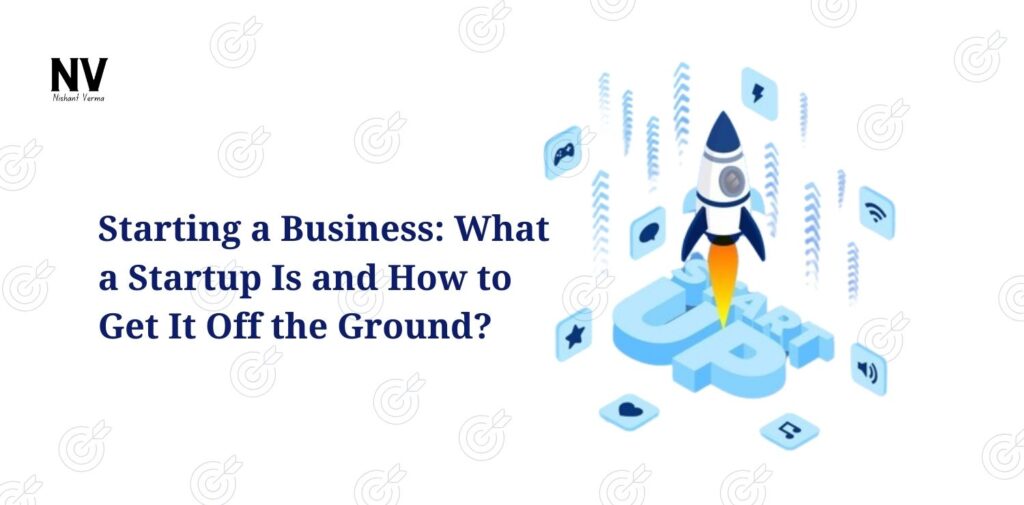Starting business can be an exciting journey, but it can also be a bit overwhelming. If you’re new to the world of entrepreneurship, you might have heard the term “startup” thrown around. In this article, we’ll explain what a startup is and guide you through the steps involved in getting one off the ground. We’ll use simple language to make sure you understand every step of the process.
What is a Startup?
In this section, we’ll start by breaking down what a startup actually is.
A startup is a type of business that’s just starting business. It’s usually a small company founded by one or a few people who have an innovative idea or solution to a problem. Startups are known for their ability to grow rapidly and disrupt traditional industries.

Characteristics of a Startup
- Innovation: Startups often bring new ideas, products, or services to the market. They aim to solve problems or uniquely meet needs.
- Growth: Startups are not content with staying small. They have ambitious plans to grow their business and reach a larger audience.
- Risk: Startups face a higher level of risk compared to established businesses. They’re venturing into uncharted territory, and not all of them succeed.
- Limited Resources: Startups typically operate with limited funds and a small team. They need to be resourceful and creative to make things happen.
- Flexibility: Startups can adapt quickly to changing circumstances. They can pivot their best business ideas model if needed.
Steps to Start a Startup: Startup Ideas
Now that you understand what a startup is let’s dive into the steps you need to take to start your own.
- Idea Generation
The first step is coming up with the best business ideas. Here’s how you can do it:
- Identify a Problem: Think about a problem or need in the world that you’re passionate about solving. This could be something in your own life or a broader issue.
- Market Research: Research the market to see if there’s demand for your solution. Look at your potential competitors and their strengths and weaknesses.
- Innovate: Find a unique angle or solution that sets your idea apart from existing options.
Business Plan: Business Ideas
Once you have a solid idea, it’s time to create a home business idea. A business plan is like a roadmap for your startup.
- Executive Summary: Start with a brief overview of your online business idea and goals.
- Market Analysis: Describe your target market, competition, and potential challenges.
- Business Structure: Decide whether you’ll be a sole proprietor, partnership, LLC, or corporation.
- Funding: Determine how you’ll finance your startup. Will it be self-funded, or will you seek investors or loans?
- Marketing and Sales: Outline your strategies for reaching customers and making sales.
- Financial Projections: Estimate your startup costs, revenue, and profit projections.
- Milestones: Set specific goals and milestones for your business.
Legalities
To start a legitimate business, you’ll need to take care of some legal matters:

- Choose a Business Name: Pick a name that’s unique and available. You may need to register it with your local government.
- Business Structure: Register your startup idea as the appropriate legal structure (e.g., sole proprietorship, LLC, corporation).
- Permits and Licenses: Determine if you need any permits or licenses to operate legally in your area.
- Tax ID Number: Obtain an Employer Identification Number (EIN) or a similar identifier for tax purposes.
Funding Your Startup: Starting business
Funding is a crucial aspect of Starting business. There are various ways to finance your startup:
- Bootstrapping: This means using your savings or revenue generated by the business to fund it. It’s the most independent way to start a startup.
- Angel Investors: Angel investors are individuals who provide capital in exchange for ownership equity in the company.
- Venture Capital: Venture capital firms invest in startups with high growth potential in exchange for equity.
- Crowdfunding: You can raise money from a large number of people through online platforms like Kickstarter and Indiegogo.
- Bank Loans: Traditional bank loans are an option, but they can be hard to secure for startups without a track record.
Building a Team
You might not be able to do everything on your own. As your startup grows, you’ll likely need to build a team:
- Hiring: Look for people with the skills and passion to help your startup succeed. Consider co-founders, employees, or freelancers.
- Delegation: Learn to delegate tasks and responsibilities. You can’t do it all yourself, and it’s important to trust your team.
- Company Culture: Establish a positive and inclusive company culture to keep your team motivated and engaged.
Product Development
If your startup involves a product, you’ll need to develop it. Here’s how:
- Prototyping: Create a prototype or a minimum viable product (MVP) to test your idea and get feedback.
- Iterate: Based on feedback, make improvements and refinements to your product.
- Quality Control: Ensure that your product meets high-quality standards before launch.
Marketing and Sales
Getting the word out about your startup and making sales is crucial for success:
- Marketing Strategy: Develop a marketing plan that includes online and offline strategies like social media, content marketing, and advertising.
- Sales Channels: Determine how you’ll sell your product or service, whether through your website, retail stores, or other channels.
- Customer Relationship: Build relationships with your customers and provide excellent customer service.
Launch and Growth
The big day is here – it’s time to launch your startup. But it doesn’t end there; you need to focus on growth:
- Launch Plan: Plan your launch carefully to create a buzz and attract customers.
- Feedback: Continuously gather feedback from customers and make improvements.
- Scaling: As your online business ideas, you may need to scale up your operations, team, and infrastructure.
- Sustainability: Consider the long-term sustainability and profitability of your business.
Challenges and Solutions
Running a startup is not always smooth sailing. There are challenges, but there are solutions, too.
Financial Challenges
- Cash Flow: Managing your finances and ensuring a positive cash flow is crucial. Create a budget and track your expenses.
- Funding Shortfalls: If you run out of money, consider seeking additional funding or cutting costs.
- Debt Management: If you have loans, manage your debt responsibly to avoid financial strain.

Competition
Competition is a part of business. Here’s how to handle it:
- Differentiation: Highlight what makes your product or service unique compared to competitors.
- Continuous Improvement: Always strive to improve your offering to stay ahead.
- Market Research: Keep an eye on the competition and adapt to changing market conditions.
Team Challenges
Managing a team can be challenging but also rewarding:
- Communication: Maintain open and effective communication within your team to avoid misunderstandings.
- Motivation: Keep your team motivated by recognizing their contributions and offering incentives.
- Conflict Resolution: Address conflicts promptly and find solutions that benefit the team.
Legal Issues
Legal matters can be complex, but they are essential:
- Contracts: Ensure you have clear contracts with employees, partners, and suppliers.
- Intellectual Property: Protect your intellectual property with patents, trademarks, or copyrights.
- Compliance: Stay compliant with local and national laws and regulations to avoid legal troubles.
Marketing and Customer Acquisition
Getting and keeping customers is a constant challenge:
- Customer Retention: Keep your existing customers happy to reduce the need for new customer acquisition.
- Adapt to Trends: Stay up-to-date with marketing trends and adapt your strategies as needed.
- Feedback Loop: Use customer feedback to improve your products and services.
Conclusion
In this article, we’ve covered the basics of what a startup is and the steps involved in getting one off the ground. Starting business can be a rewarding journey, but it requires careful planning, hard work, and a willingness to adapt. Remember that many successful businesses started as startups, and with determination and the right strategy, you can achieve your entrepreneurial dreams, too.
Starting business can be both exciting and challenging. But with the right idea, planning, and determination, you can turn your vision into a successful business. Whether you’re innovating in a new industry or improving an existing one, the world of startups is filled with opportunities for those willing to leap.
Starting business is a journey, and like any journey, it requires preparation, a roadmap, and the willingness to adapt along the way. So, if you have that innovative idea and the drive to make it happen, go ahead and start your startup adventure. It might just be the beginning of something incredible.




